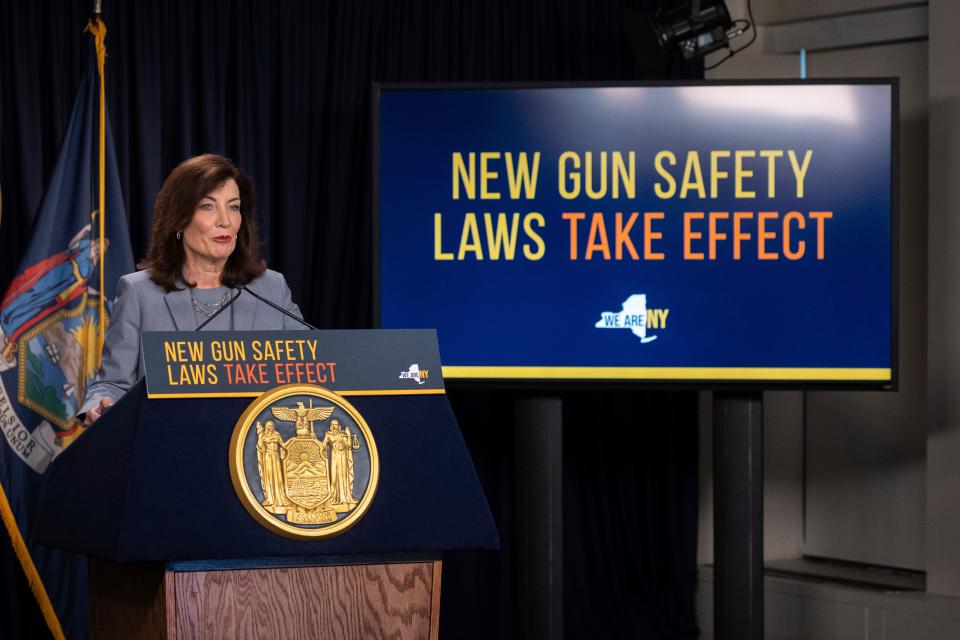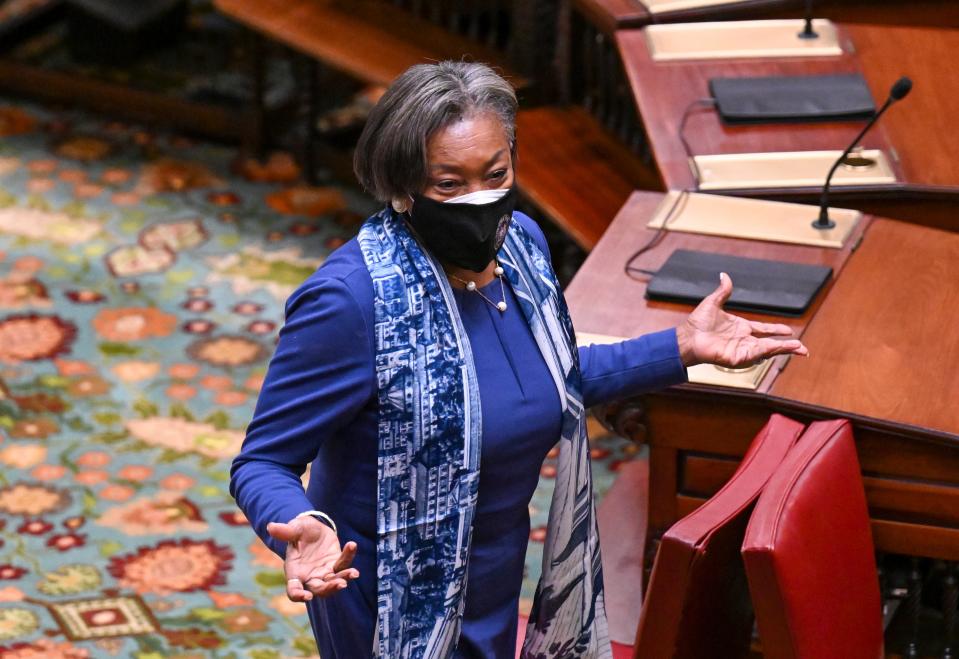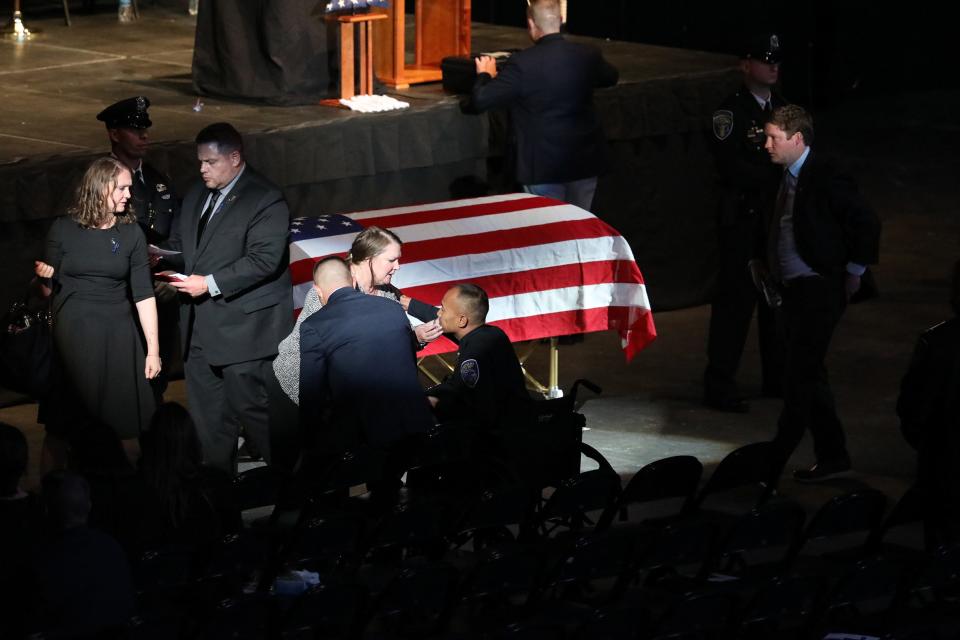Former Lt. Gov. Bob Duffy urges Hochul to call special session on rising violence, bail reform
- Oops!Something went wrong.Please try again later.
- Oops!Something went wrong.Please try again later.
- Oops!Something went wrong.Please try again later.
Former Lt. Governor Bob Duffy has called on Gov. Kathy Hochul and leaders in the state legislature to convene a special session to reassess bail reform policies amid rising violence in the City of Rochester.
In a letter to Hochul and Democratic leaders in the legislature, Duffy outlined recent acts of violence in Rochester and concluded: "I have never seen the issues of crime and public safety be as bad as they are today," framing the comment through his four decades in public life.
Duffy outlined his concerns in a two-page letter to Hochul that was dated July 25 and released to the media this week. His letter was also addressed to state senate majority leader Andrea Stewart-Cousins and assembly speaker Carl Heastie. The release of the letter comes less than four weeks before an election in which the impact of bail reform and other legislative measures, like gun control, have been constant political fodder across New York.

Duffy joined the Rochester Police Department in 1976, rising through the ranks to serve as chief from 1998 to 2005. He was Rochester's mayor from 2006-10 and served as New York's Lt. Governor during Andrew Cuomo's first term (2011-14). He has served as president and CEO of the Greater Rochester Chamber of Commerce since 2015.
In a phone interview Thursday, Duffy said he distributed the letter to state lawmakers who represent the Rochester area in September, and it was leaked two weeks ago, before chamber of commerce distributed copies to the press, including the Democrat & Chronicle, on Wednesday.
What did Duffy's letter say about bail reform?
Duffy, who ran for office as a Democrat, said bail reform and other efforts at improving the criminal justice system were well-intentioned and that he supported policies that had sought to address economic and racial inequities.
"We were at a point of criminalizing poverty, which is wholly unacceptable and was in desperate need of reform," Duffy wrote. "No one should remain in jail awaiting trial if they are eligible for bail but are unable to afford the cost due totheir economic challenges."
But Duffy said those reform efforts had resulted in a number of unintended consequences, including both a rise in violent crime and political divisions.
"As a fellow Democrat, we can’t blame the other party because we are in charge and we own this situation. We can certainly have safe communities and strong police-community relationships if we are willing to work hard to achieve it," Duffy said. "Instead, we have demoralized law enforcement for the inappropriate actions of a few and created more divisions than I have seen in my entire life."
Republican campaigns across the state have focused on rising crime as a central issue, attacking Democratic candidates for their stances and pointing to reform policies as the primary cause. While Duffy did not say it in the letter, the implication is that significant electoral losses may loom if voters are convinced by this argument.
How have Hochul and others responded?

Matt Janiszewski, the governor’s Upstate press secretary, in an emailed statement said that Hochul has worked with the Legislature to address gun crime, repeat offenders, and expand the types of cases where judges have discretion to set bail. The governor has also met with local elected officials, community leaders and law enforcement to address crime and violence in Rochester and Monroe County.
In a phone interview, Duffy said the letter was an appeal to state leaders to act on concerns he’s heard from community leaders about crime. He confirmed he had two conference calls with Hochul on July 29 (postdating the July 25 letter) and again on Aug. 23 to discuss crime and violence in Rochester and Monroe County alongside local elected officials, community leaders and law enforcement.
“The governor will continue to work every day with law enforcement and local officials to improve the criminal justice system, combat violence, and strengthen public safety across New York,” Janiszewski said.
In a statement Thursday, Stewart-Cousins responded, "Everyone understands the importance of increasing public safety, but succumbing to national Republican fear mongering around bail reform, misses the opportunity to adopt real solutions. Facts matter. Study after study ― as covered by Newsday, the Times Union and the NY Times ― have shown that bail reform has had no effect on the crime rate. And while crime remains at historically low levels, the proliferation of guns on our streets is historically high. We need truth ― not fear ― to guide our responses to this crisis."

What will the release of the letter mean ahead of the election?
With weeks before the election, Duffy stressed the letter wasn’t political in a phone interview. He doesn’t publicly endorse candidates but said he’s had a long history and friendship with Hochul and a short relationship, but good relationship, with Zeldin.
"This issue is not about politics,” he said. “It’s about public policy and service.”
“Men, women and children in our poorest neighborhoods, they’re the ones being victimized on a daily basis,” Duffy said. “I do think there has to be a coming together and look at, as opposed to a war of words and data points, to actually sit down and listen to all sides.”
Crime has become a campaign issue in the midterm elections. Republican gubernatorial candidate Lee Zeldin, a Long Island congressman, has frequently attacked Democratic leadership in New York State, aiming to pin spikes in crime on Gov. Kathy Hochul, who was lieutenant governor when the state Legislature and former Gov. Andrew Cuomo passed bail reform laws in 2019.
Hochul had a 10-point advantage over Zeldin in a Marist College poll released Thursday of more than 1,000 registered voters in early October. Crime ranked third behind inflation and preserving democracy in what was top of mind with voting on Nov. 8.
In a statement, Lee M. Miringoff, the director of the Marist Institute for Public Opinion, said any shift to crime in the closing weeks is likely to benefit Zeldin.
What does Rochester crime data show?
One thing is clear: violent crime in Rochester has gone from historic lows to record highs in a span of a few years. What's less clear is why.
The city experienced 28 homicides in 2018 and 154 shooting victims, both of which represented the lowest totals since 2000. But violence spiked dramatically in 2020 (52 homicides, 335 shooting victims) and rose even higher in 2021. The 81 homicides last year and 419 shooting victims surpassed anything on record.
As of Thursday, there have been 66 homicides in the city of Rochester, a pace ahead of last year's record total. Three hundred people have been shot in the city so far this year.
The implementation of bail reform and other policy changes coincided with the crushing impact of the COVID-19 pandemic, making it difficult to determine what role those measures have played in rising violence. States that did not enact public safety reforms have seen similar spikes in violence.
A study by the state's Department of Criminal Justice concluded recently that outside of New York City, the number of individuals who were rearrested after being released with no bail had risen, from 14% in 2019 to 19% in 2021. The number of those people who were charged with a violent felony after being released on their own recognizance rose from 1% to 3%. But the DCJS report also cautioned that the pandemic caused courts to close at times, and public health policies had an impact on the number of people who were held in custody.
Rochester police have said recently that much of the recent gun violence in their city has been driven by drug gangs battling over territory in and around the city's North Clinton neighborhood. They allege that groups aligned with the Bloods and the Crips have enlisted members from outside the region to perpetrate violence against their rivals in an effort to exert their hold on the illegal marijuana market. Police said this turf war led to the fatal shooting of Rochester Police Officer Anthony Mazurkiewicz in July.

Other shootings have been driven by disputes that have led to waves of back-and-forth violence. Shots are fired into a house in one neighborhood, followed by an act of retaliation in another neighborhood the next day.
It's unclear whether bail reform has played a role in either of these waves of violence. But the absence of clear data on the causes of rising violence, or the impact of bail reform hasn't stopped political candidates from making it a central issue this fall.
Public safety: Rochester's 30-year cycle of violence
What are Bob Duffy's concerns with bail reform?
Duffy acknowledged in his letter that there were several causal factors behind the rise in violence, but he argued that much of it came down to the need for stronger policies and leadership to address what he called "the lawlessness that is prevalent in so many of our communities today."
His letter outlined three major areas of concern with New York's reform measures; echoing the talking points that Republicans and law enforcement leaders have been sharing for months.
Individuals charged with violent crime being released with no bail: "Robberies, assaults, car-jackings, and illegal gun possessions plague our streets every day and the perpetrators are being met with appearance tickets," Duffy wrote. "It is commonplace for these individuals to be arrested, booked, and released on an appearance ticket, only to reoffend after which the same process ensues."
Judges not being allowed to use their own judgment on bail decisions: "There was a time when the possession of an illegal gun brought a mandatory one-year jail sentence. That law was eventually changed because advocates fought for more judicial discretion. Ironically, it is that same group of advocates now arguing against judicial discretion regarding bail. Judges are elected by their communities and certainly deserve to have the ability to exercise discretionand be held accountable for it."
Not considering the likelihood that an individual would commit other crimes in determining bail: "Yes, there should be a 'Dangerousness Clause' and it should be viewed by the actions of an individual – and not their ethnicity," Duffy wrote. "We are creating an environment where there are no consequences for bad behavior."
Bail reform:More context on the limitations of bail reform data
Duffy's letter called for state leaders to convene leaders in law enforcement, the judiciary, victim’s advocacy groups,mayors, county executives, and other reform advocates to begin a process to evaluate what is working and to change what is not.
"If you could call a special session on public safety and truly listen, debate, compromise, and act on those areas that can begin to turn the tide, you would be performing a great public service," Duffy wrote.
Editor's Note: An adjective that was potentially misleading was removed from a description of the data of the number of individuals rearrested outside of New York City between 2019 and 2.
This article originally appeared on Rochester Democrat and Chronicle: Bob Duffy letter urges Gov. Hochul to call bail reform special session

